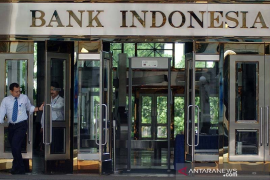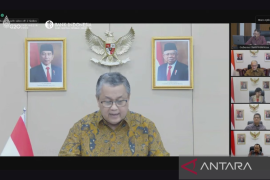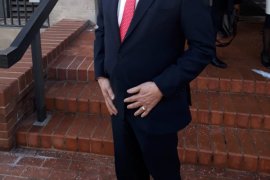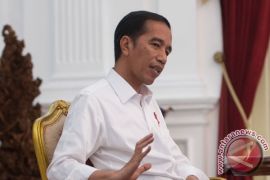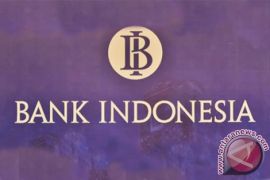Based on the Indonesian Balance of Payments (NPI), the capital inflow amounted to US$16.7 billion in 2015, which drastically dropped from US$26 billion in 2014.Jakarta (ANTARA News) - The governments step to launch a series of economic policy packages and the effort by the Indonesian central bank (Bank Indonesia/BI) to lower its benchmark rate are expected to boost foreign capital inflows to Indonesia.
The BI has forecast that the capital inflow of foreign investment will increase significantly this year compared to that recorded in 2015.
"Capital inflow this year is expected to increase two folds from that in 2015," Director of Monetary and Economic Policy of the BI Solikin M. Juhro was quoted as saying in Bandung, West Java, by RepublikaOnline on Saturday.
Based on the Indonesian Balance of Payments (NPI), the capital inflow amounted to US$16.7 billion in 2015, which drastically dropped from US$26 billion in 2014.
However, the capital inflow this year is expected to double the figure recorded in 2015, thanks to the various measures adopted by the government to improve the investment climate in Indonesia.
"Until mid-February of 2016, a total of Rp33 trillion (some US$2.5 million) of capital inflow has been recorded in Indonesia," noted Solikin.
There is an increasing trend in capital inflow as reflected in the State Debentures (SUN) market in line with an improvement in investor perception regarding Indonesias economic prospects and with the decline in global financial market risks.
The positive perception of investors is improving following the lowering of the benchmark rate of Bank Indonesia (BI Rate). The BI has lowered its key rate to seven percent in a bid to improve the investment climate.
Besides this, the government has also been successful in boosting investor trust through its fiscal stimulus policy, particularly with the swift realization of infrastructure projects.
BI Governor Agus Marto Wardojo noted that in the first two months of 2016, the central bank had twice lowered its key rate respectively by 25 basis points to seven percent. In order to lift banking liquidity, the primary reserve requirement has also been lowered to 6.5 percent, which will come into effect as of March 16, 2016.
He said the governments latest or tenth economic policy package includes the revision of the investment negative list (DNI) where some economic sectors that were earlier closed to foreign investors have now been opened to them. The revision of the DNI helps attract foreign investment.
"We hope the DNI revision will help to attract more foreign direct investment to Indonesia," Agus stated on the sidelines of a government coordination meeting in Kupang, East Nusa Tenggara, recently.
Business sectors removed from the DNI included features brokerage, cold storage, toll road projects, restaurants, sports, film industry, telecommunications, raw medicine industries, and health services.
Due to the governments steps to improve Indonesias investment climate, BI Senior Deputy Governor Mirza Adityaswara is convinced that the nations economic growth this year would be in the range of BIs forecast of 5.2-5.6 percent.
"It is reasonable to achieve 5.2 percent. To achieve the 5.6 percent growth will indeed need extra efforts but 5.2 percent or 5.3 percent is reasonable," Mirza pointed out.
The economic downturns in Indonesia in 2014 and 2015 were seen in commodity-producing provinces such as those in Sumatra and Kalimantan.
"Now, the prices of commodities are no longer declining. Thus, economic growth in Sumatra and Kalimantan can show better improvement," he remarked.
The economic growth in Java will depend on the stability of the rupiah exchange rate as several industries still need to import raw materials.
"If the local currency is stable, then economic activities and economic growth will increase," Mirza affirmed.
According to Solikin, the increase in inflow will support the strengthening of the rupiah currency and economic activities in the country.
"Actually, the rupiah is the strongest local currency in the region. So, what we need is to improve investor perception," Solikin added.
Therefore, investor perception must continue to be improved to attract foreign capital inflow and to strengthen the value of the local rupiah currency against the US dollar.
Solikin M. Juhro stated that the economic policy and reform packages issued by the government in the past several months had yielded positive results.
"If one observes, the rupiah is the strongest currency in the region. So, what we should manage now is the investor perception," Solikin noted in Benadung, West Java, on Monday.
As the inflation and the value of the rupiah are under control, the momentum for the continuation of the upward trend in economic growth should be maintained and preserved.
"This is our common concern. If it has become our common concern, it will trigger the emergence of positive perception among investors, and it will boost capital inflow and further strengthen the value of the rupiah currency," he noted.
Solikin said the Fed had indicated it would postpone its plan to raise its interest rate until the second semester of this year. This could be utilized to relax the monetary policy.
"It would be a pity if the opportunity to relax the monetary policy is not utilized, yet we should remain wise regarding the macroeconomic stability" he stated.
However, Indonesia should remain cautious regarding external risks such as the Chinese economy, which has not yet returned to a stable level.
The rupiah has been hovering at a stable level with a strengthening trend as the inflow of foreign capital is on the rise in line with the decrease in global financial risks and the positive perception of the domestic economy.
During the fourth quarter of 2015, the value of the rupiah strengthened by some 6.27 percent point-to-point and reached Rp13,785 per US dollar.
The appreciation of the rupiah continued until January 2016. It successfully strengthened by 0.1 percent point-to-point and closed at Rp13,775 per US dollar at the end of January 2016.(*)
Reporter: Andi Abdussalam
Editor: Heru Purwanto
Copyright © ANTARA 2016
